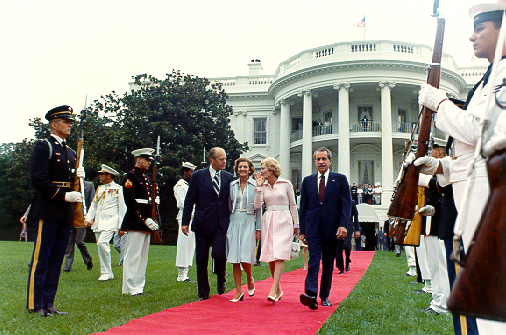On this day in 1913, Gerald Ford, the 38th President, is born in Omaha, Nebraska.
Gerald Ford grew up in Grand Rapids, Michigan, and played football at the University of Michigan. He was voted the team MVP in his senior year. In 1941, he obtained a law degree from Yale and was also a model. Next, in 1942, he joined the Navy and served in World War II until it ended in 1945.
Then, in 1973, President Richard Nixon chose Gerald Ford to be his vice president. As such, Ford became the first vice president to assume office after the resignation of a president when Nixon resigned in 1974.
Ford’s presidency began on the heels of the divisive Vietnam War and the Watergate scandal. In addition, he narrowly avoided two assassination attempts.
“Justice Without Mercy”
Ford faced fierce criticism for his decision to pardon Richard Nixon upon becoming president, in an effort, as he saw it to “write the end” to “an American tragedy” that could “go on and on.” Here are some more of his remarks about the pardon:
“I have promised to uphold the Constitution, to do what is right as God gives me to see the right, and to do the very best that I can for America.
I have asked your help and your prayers, not only when I became President but many times since. The Constitution is the supreme law of our land and it governs our actions as citizens. Only the laws of God, which govern our consciences, are superior to it.
As we are a nation under God, so I am sworn to uphold our laws with the help of God. And I have sought such guidance and searched my own conscience with special diligence to determine the right thing for me to do with respect to my predecessor in this place, Richard Nixon, and his loyal wife and family.
Theirs is an American tragedy in which we all have played a part. It could go on and on and on, or someone must write the end to it. I have concluded that only I can do that, and if I can, I must.”
“I deeply believe in equal justice for all Americans, whatever their station or former station. The law, whether human or divine, is no respecter of persons; but the law is a respecter of reality.”
“I do believe that right makes might and that if I am wrong, ten angels swearing I was right would make no difference. I do believe, with all my heart and mind and spirit, that I, not as President but as a humble servant of God, will receive justice without mercy if I fail to show mercy.”
Gerald Ford died the day after Christmas in 2006, at the age of 93.




